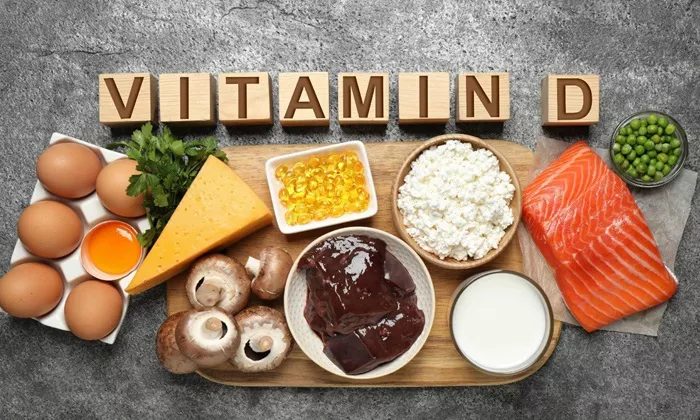Vitamin D is a vital nutrient that plays a crucial role in maintaining overall health. Known primarily for its role in bone health, it also supports immune function, muscle health, and has been linked to mood regulation. However, unlike some nutrients, vitamin D is not abundant in most foods, and many people struggle to get enough from their diet alone. In this comprehensive guide, we’ll explore the best food sources of vitamin D, delve into the benefits of this essential vitamin, and offer tips on how to ensure you meet your daily requirements.
Vitamin D: Importance and Functions
Vitamin D, often referred to as the “sunshine vitamin,” is unique because it can be synthesized by the body when the skin is exposed to sunlight. Despite this, many people still struggle to get enough vitamin D through sun exposure alone, especially in regions with limited sunlight or during winter months. Therefore, obtaining vitamin D from dietary sources becomes essential.
The Role of Vitamin D
Vitamin D helps the body absorb calcium and phosphorus, which are critical for maintaining healthy bones and teeth. It also plays a role in muscle function and immune system support. Research suggests that adequate levels of vitamin D may help protect against certain diseases, including osteoporosis, heart disease, and certain cancers.
Types of Vitamin D
There are two main forms of vitamin D: D2 (ergocalciferol) and D3 (cholecalciferol). Vitamin D3 is the form produced by the skin in response to sunlight and is also found in animal-based food sources. Vitamin D2 is derived from yeast and fungi and is often found in fortified foods. Both forms are effective at raising blood levels of vitamin D, but D3 is generally considered more potent and longer-lasting.
See Also: How Many Multivitamins Can I Take a Day?
Top Food Sources of Vitamin D
Getting sufficient vitamin D from food can be challenging, but there are several excellent sources available. Here’s a detailed look at the best dietary sources of this essential nutrient.
Fatty Fish
Fatty fish are among the richest natural sources of vitamin D. They not only provide a high dose of this vitamin but also offer other important nutrients, such as omega-3 fatty acids and high-quality protein.
Salmon: A single serving of salmon (approximately 3.5 ounces) can provide up to 570 IU (International Units) of vitamin D, which covers more than half of the daily recommended intake for most adults.
Mackerel: This fish is another excellent source, with around 360 IU of vitamin D per 3.5-ounce serving.
Sardines: Canned sardines, a more budget-friendly option, provide approximately 270 IU per 3.5 ounces.
Tuna: Fresh tuna offers around 154 IU per 3.5 ounces, while canned tuna provides slightly less but is still a good source.
Cod Liver Oil
Cod liver oil is one of the most concentrated sources of vitamin D. A single tablespoon of cod liver oil can provide about 1,360 IU of vitamin D, which is more than the daily recommended intake for most adults. It’s also high in omega-3 fatty acids, making it a great supplement for overall health.
Fortified Foods
Many foods are fortified with vitamin D to help prevent deficiencies in the general population. These fortified foods can be a significant source of vitamin D, especially for those who have limited sun exposure.
Fortified Milk: Most milk sold in supermarkets is fortified with vitamin D. A typical cup (8 ounces) contains about 115-130 IU of vitamin D.
Fortified Orange Juice: Some brands of orange juice are fortified with vitamin D, offering around 137 IU per cup.
Fortified Cereals: Many breakfast cereals are fortified with vitamin D, though the amount can vary. On average, a serving may provide around 40-100 IU.
Eggs
Eggs are a good source of vitamin D, particularly in the yolk. One large egg yolk contains about 37 IU of vitamin D. While this is a relatively small amount compared to other sources, incorporating eggs into your diet can contribute to your overall vitamin D intake.
Mushrooms
Mushrooms are unique among plant foods as they can produce vitamin D when exposed to UV light. Certain types of mushrooms are particularly high in vitamin D:
Shiitake Mushrooms: These provide about 100 IU of vitamin D per 3.5-ounce serving when exposed to UV light.
Portobello Mushrooms: Portobellos exposed to UV light can provide around 300 IU of vitamin D per 3.5 ounces.
Button Mushrooms: These can offer varying amounts of vitamin D depending on their exposure to UV light, with some providing up to 250 IU per serving.
Beef Liver
Beef liver is another excellent source of vitamin D. A 3.5-ounce serving can provide approximately 50 IU of vitamin D. While not as rich as some other sources, it’s still a valuable addition to a balanced diet.
Cheese
Cheese can be a modest source of vitamin D, though the amount varies between types. For example, Swiss cheese provides about 6 IU of vitamin D per ounce, while cheddar and mozzarella offer slightly lower amounts.
Tips for Optimizing Vitamin D Intake
Ensuring adequate vitamin D intake can be challenging, but here are some practical tips to help you meet your daily needs:
Sun Exposure
While this article focuses on dietary sources, it’s worth noting that regular sun exposure can significantly boost your vitamin D levels. Aim for about 10-30 minutes of sun exposure on your face and arms several times a week, depending on your skin type and local weather conditions.
Supplementation
For those who struggle to get enough vitamin D from food and sunlight, supplements can be an effective option. Vitamin D supplements come in various forms, including D2 and D3, and are available in different dosages. Consult with a healthcare provider to determine the appropriate dosage for your needs.
Combining Sources
Combining different sources of vitamin D can help you achieve optimal levels. For example, having a serving of fatty fish a few times a week, along with fortified foods and occasional sun exposure, can contribute to maintaining adequate vitamin D levels.
Conclusion
Vitamin D is a vital nutrient with numerous health benefits, from supporting bone health to boosting the immune system. While sunlight is a primary source of vitamin D, obtaining it through diet is crucial, especially for those with limited sun exposure. Fatty fish, cod liver oil, fortified foods, eggs, mushrooms, beef liver, and cheese are excellent dietary sources of vitamin D. By incorporating these foods into your diet and considering supplements if needed, you can ensure that you meet your vitamin D needs and support your overall health. In summary, maintaining an adequate intake of vitamin D is essential for good health. By understanding the best food sources and how to incorporate them into your diet, you can effectively support your body’s needs and enjoy the numerous benefits of this crucial nutrient.
[inline_related_posts title=”You Might Be Interested In” title_align=”left” style=”list” number=”6″ align=”none” ids=”11536,11540,11233″ by=”categories” orderby=”rand” order=”DESC” hide_thumb=”no” thumb_right=”no” views=”no” date=”yes” grid_columns=”2″ post_type=”” tax=””]


































